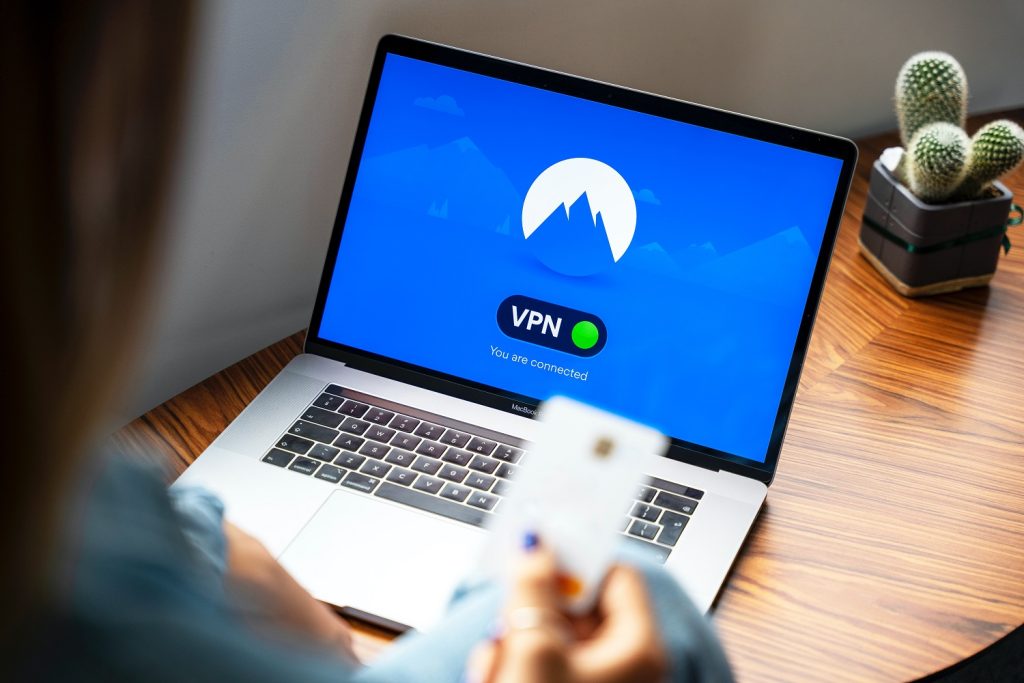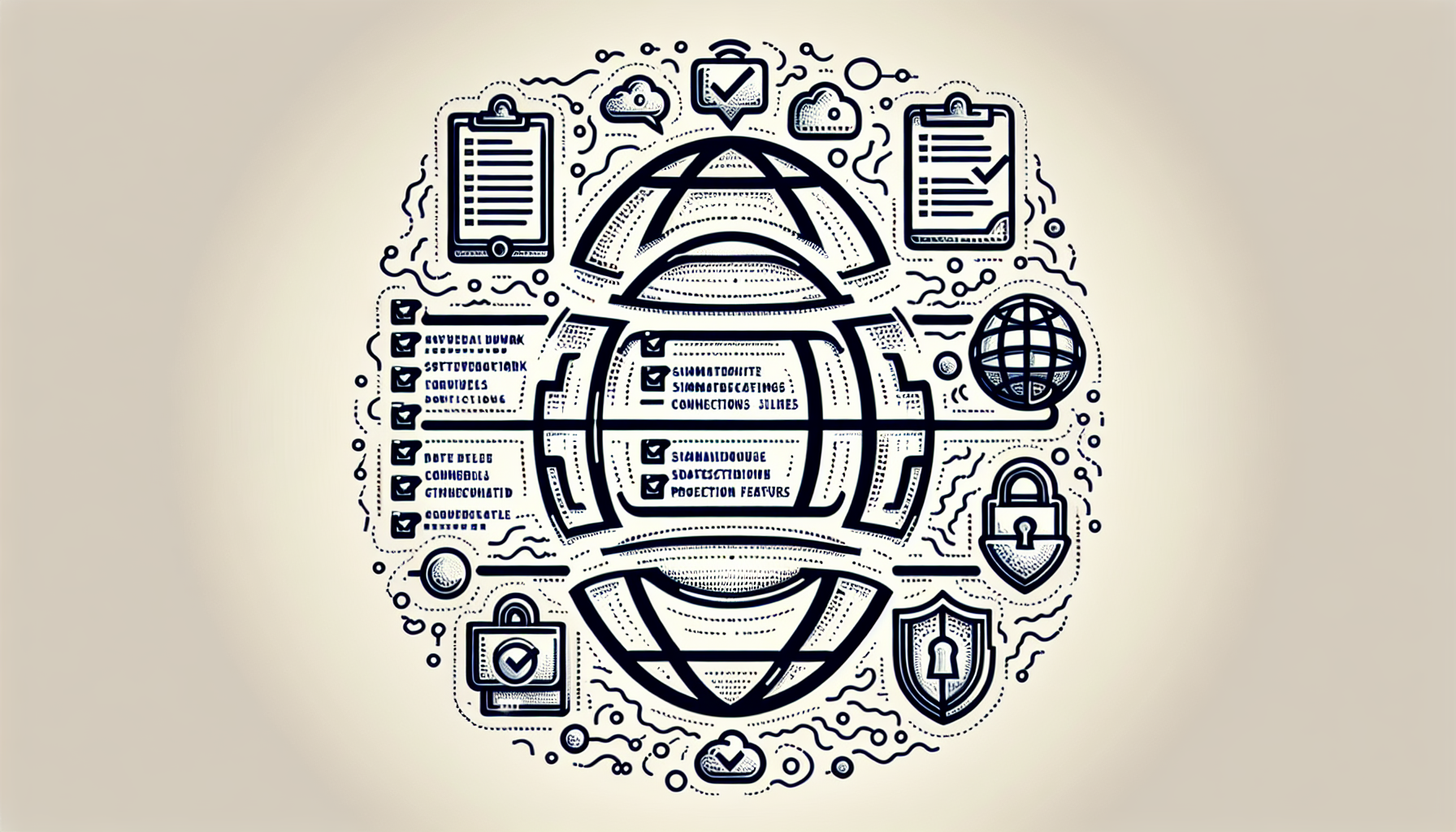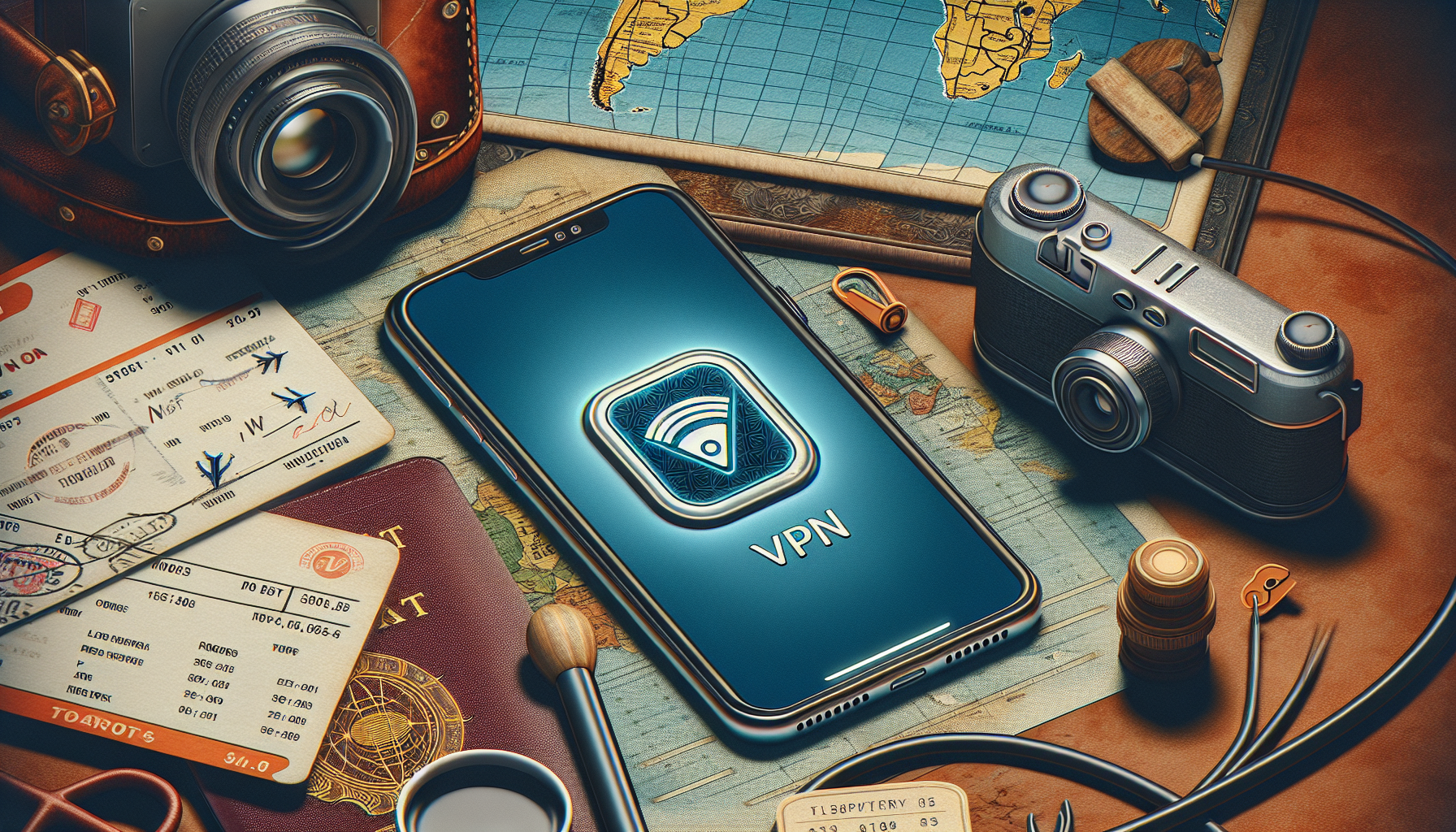Navigating online threats and geo-restrictions makes finding the best VPNs for travel crucial. This no-fluff guide delivers straightforward recommendations for VPNs that provide top-notch security, effortless access to services from home, and consistently fast connectivity abroad.
We’ll help you choose a VPN that ensures your digital safety and seamless internet experience, no matter where in the world your travels take you.

Table of Contents
Key Takeaways
- VPNs ensure secure and private internet usage on public Wi-Fi, allow travelers to bypass geo-blocks, and avoid account lockouts due to frequent location changes.
- Before travel, it’s crucial to select a reliable VPN that supports all devices, configure it beforehand (especially in countries with restrictions), and test its speed to predict its impact on internet performance.
- A competent travel VPN should offer a broad server network, allow multiple simultaneous connections, provide strong encryption with a kill switch and leak protection, and have the capability to overcome geo-restrictions efficiently.
How VPNs Can Enhance Your Travel Experience

When you’re on the go, maintaining a secure connection on public Wi-Fi can be a risky business. It can leave you open to scams and expose your sensitive data. However, with a trusty virtual private network (VPN), you can shield your internet traffic from potential threats. By encrypting your incoming and outgoing traffic, a VPN ensures that your data is safe from prying eyes.
Moreover, as an international traveler, you might find yourself hindered by geo-blocking. This restricts access to certain websites and services depending on your geographical location. This is where a VPN comes in handy. By connecting to a VPN server in a different country, you can bypass these geo-blocks and enjoy unrestricted access to services you normally use at home, or even those that are exclusive to the country you’re visiting. Some benefits of using a VPN while traveling include:
- Accessing your favorite streaming services from anywhere in the world
- Protecting your sensitive data and personal information from hackers and cybercriminals
- Keeping your online activities private and anonymous
- Avoiding censorship and surveillance in countries with strict internet regulations
With a reliable VPN service, you can have peace of mind and enjoy a secure and unrestricted internet experience while traveling, as it effectively manages your VPN traffic.
Beyond security and freedom, VPNs offer another crucial benefit to travelers: preventing account lockouts. When you access your accounts from various locations around the world, it might trigger security protocols that could lock you out. But with a VPN, you can avoid this inconvenience by making it seem like you’re logging in from a familiar location.
Top-Tier Travel VPNs: Expert Picks for 2024

A few VPNs have emerged as favorites among the tech-savvy travel crowd. These VPNs have proven their worth in offering extensive server networks, fast and reliable connections, and user-friendly experiences.
Among the top contenders are NordVPN, Surfshark VPN, ExpressVPN, and Private Internet Access, making them some of the best VPN options available.
Let’s take a closer look at what makes these VPNs stand out.
NordVPN: The Globetrotter’s Choice
NordVPN has been a favorite among globetrotters, and for a good reason. Here’s why:
- Over 5,000 servers spread across 60 countries
- Enables travelers to unblock geo-restricted content and maintain connectivity worldwide
- Robust security features
This expansive server network, coupled with robust security features, makes NordVPN a top choice for travelers.
In terms of security, NordVPN offers:
- 256-bit encryption for secure data transmission
- OpenVPN protocol
- Internet kill switch
- DNS leak protection
These features provide travelers with peace of mind, knowing that their data will remain secure even while using public Wi-Fi networks in airports, hotels, and cafes.
But security isn’t the only thing NordVPN excels at. It’s also well-regarded for its fast connection speeds and user-friendly features. With options like Double VPN and Onion Over VPN, NordVPN caters to both novice VPN users and power users who require advanced functionality.
Surfshark VPN: Unlimited Connections On-the-Go
Next on our list is Surfshark VPN. What sets Surfshark apart is its offer of simultaneous unlimited device connections. This feature allows travelers to protect all of their devices with a single account, making it an ideal choice for families or groups traveling together. Plus, at approximately $60 a year in promotional periods, Surfshark VPN provides excellent value for the money, especially for those with multiple devices.
Surfshark VPN boasts user-friendly mobile apps available on a variety of platforms, including:
- Windows
- Android
- MacOS
- iOS
- Linux
This wide compatibility ensures that no matter what device you’re using, you’ll be able to stay protected.
Finally, Surfshark VPN offers an impressive server presence. With over 3,200 servers in 100 countries, it provides versatile connections for travelers worldwide. This extensive server network means you’ll be able to access local content and services no matter where your travels take you.
ExpressVPN: Best VPN for Mobile
When it comes to streaming on the go, ExpressVPN takes the crown. It’s renowned for being a great VPN for mobile and tablets and it’s exceptionally adept at unblocking a variety of streaming services such as:
- Netflix
- Amazon Prime Video
- Disney+
- HBO
- Hulu
This means you’ll never have to miss out on your favorite shows or movies, even when you’re thousands of miles away from home.
But what good is unrestricted access if your connection isn’t fast enough? Thankfully, ExpressVPN offers fast connection speeds, thanks to its quick connection establishment and the Lightway protocol’s balance of performance and security. Whether you’re streaming in HD or just browsing the web, you can expect a smooth and lag-free experience.
ExpressVPN offers the following features:
- 160 server locations across 94 countries, particularly in the American region
- Up to eight simultaneous connections, allowing you to connect multiple devices at once
- Seamless entertainment across your devices, whether you’re at the airport, hotel, or cafe
IPVanish VPN: Best for Beginners
With its user-friendly interface and simple configuration options, IPVanish is a great VPN for beginners. It boasts over 2,000 servers in 75+ locations and you can easily switch between them for optimum speed.
It works on a variety of platforms, including:
- Windows
- MacOS
- iOS
- Android
- Chrome
- Linux
- Fire TV
- Android TV
- Apple TV
So, you’ll be able to use it on nearly all of your devices! This broad coverage, and the extensive list of countries offered by this VPN, make it a great option; especially if you favor functionality over design.
Private Internet Access VPN: Best for U.S. Travel
With 35,000+ VPN servers in 91 countries, Private Internet Access (PIA) is one of the best VPNs for travel. It’s also arguably the best VPN for travel within the U.S. with servers in each of the 50 U.S. states.
As a VPN it’s easy to use, and all you have to do is download it and click a button to get it working. This simplicity is complemented by an attractive design, which makes for a seamless user experience.
Using PIA won’t break the bank either. It’s cheaper than ExpressVPN and NordVPN, but it offers unlimited simultaneous connections (ExpressVPN and NordVPN don’t) and a kill switch that prevents you from accessing the internet if the VPN gets disconnected. It also boasts obfuscated servers, which makes it harder for apps to identify when you’re using a VPN. So, you should be able to watch all of your favorite shows in peace!
Pure VPN: Best for Speed
If you’ve got a need for speed, look no further than Pure VPN. They claim to be one of the fastest VPNs available and you’ll find various speed tests on the internet that back up this claim. You can even check your VPN’s speed when you download the app.
Aside from its speed, PureVPN is highly affordable and has a total of 6,000 servers spread over 70+ countries. And, while it doesn’t cover as many countries as other VPNs in this list, you’ll find that it has servers in the majority of the most popular countries for traveling. So, if you want a VPN for streaming Netflix whilst on your travels, it represents a great option.
Proton VPN: Best for Privacy & Offers a Free Plan
Developed by the same team behind ProtonMail, a respected encrypted email service, ProtonVPN has a strong focus on privacy. It comes with a free plan, which lets you connect to servers in 5 countries, and also has the option of a paid plan with over 3,600 servers in more than 85 countries.
ProtonVPN offers a strict no-logs policy, meaning it does not collect or store any information about users’ online activities. The service offers features such as Secure Core, which routes internet traffic through multiple servers in privacy-friendly countries for added security. It also includes a kill switch feature, which automatically disconnects the user’s internet connection if the VPN connection drops, preventing any data leaks. So, if you’re looking for a secure VPN, ProtonVPN ticks all the boxes.
Overall, ProtonVPN is renowned for its commitment to privacy and security, making it a popular choice among individuals seeking to safeguard their online activities. The fact that it also offers a free option makes it an even more appealing choice for travelers on a budget.
Essential Criteria for Selecting a Travel VPN

When it comes to choosing a VPN for travel, several factors need to be considered. First and foremost, a travel VPN should have a broad server network. The more locations a VPN covers, the better it will be at ensuring you can connect to a local server while traveling. This can help improve connection speeds and allow you to bypass geo-blocks more effectively.
Next, consider the number of simultaneous connections allowed by the VPN. If you’re traveling with multiple devices or sharing the VPN with travel companions, a VPN that offers more simultaneous connections can be a more cost-effective choice. You should also look for advanced protection features such as:
- a kill switch
- DNS leak prevention
- the option for dedicated IP
- split tunneling
These features can enhance your security and user experience.
Lastly, consider the following factors when choosing a VPN:
- The VPN’s ability to bypass geo-restrictions
- Its performance record
- What software it works with
- Its reputation for customer service
- Pricing and the length of the money-back guarantee periods
After all, the value offered by the VPN service should justify its cost.
Navigating Network Speeds: VPNs and Internet Performance
While VPNs offer a multitude of benefits, they can impact your internet performance. The fastest travel VPNs can reduce internet connectivity only by 10% to 20%, mitigating the impact on internet-intensive tasks. However, a VPN connection may decrease speeds to some extent due to encryption, though the change should be imperceptible to users with high-performance VPNs.
To improve your connection speeds while using a VPN, consider the following:
- Choose a server that is physically closer to your location.
- Use speedier VPN protocols like IKEv2, WireGuard, Lightway, and NordLynx, which can provide faster speeds compared to OpenVPN.
- For instance, NordVPN’s NordLynx protocol delivered high download speeds of over 950 Mbps, showcasing its efficiency.
However, do bear in mind that using a VPN can increase latency due to the added distance for data to travel through the VPN server. This effect, known as the trombone effect, can affect the performance of latency-sensitive applications.
Choosing VPNs with User-Friendly Software
As with any software, the usability of a VPN app can significantly impact your overall experience. Most VPN providers offer apps for major operating systems, ensuring compatibility with devices typically used by travelers, including those with:
- Windows
- MacOS
- Linux
- Android
- iOS platforms
For instance, NordVPN and Surfshark VPN are noted for their wide compatibility. They support:
- Major operating systems
- Browser plugins
- Apps for smart TVs
- Apps for gaming consoles
This comprehensive support means you can protect virtually any device, anywhere, anytime, with the added assurance of a 30 day money-back guarantee in both instances.
Finally, a user-friendly interface is crucial for a smooth VPN experience. NordVPN, for instance, is recognized for its intuitive design across all its applications. Whether you’re using the VPN on your Windows laptop, Android smartphone, or iOS tablet, you’ll find it easy to navigate and use the VPN’s various features.
Planning Ahead: Why Downloading a VPN Pre-Trip Makes Sense
Before you embark on your journey, it’s a good idea to:
- Download and update your VPN
- Doing so can prevent potential issues such as app crashes or performance glitches during your trip
- It’s also crucial to keep your VPN app updated to benefit from the latest security features and vulnerability patches.
Once you’re at your destination, you might want to consider using features like Meshnet. This feature can link multiple devices into a secure network, emphasizing the ease of using a VPN while traveling. Whether you’re traveling alone or in a group, having a VPN set up before your trip can ensure a smooth and secure connectivity experience throughout your journey.
Preparing Your VPN Before Departure

Before you embark on your journey, it’s essential to set up your VPN. By downloading and configuring your VPN before your arrival, you ensure that you’ll have secure and unrestricted access to the internet during your stay. However, you should be careful if you’re heading to countries like China, where VPNs may be blocked and in some cases their use deemed illegal.
Choosing the right VPN service is equally important. The first thing to check is whether the VPN provider offers apps compatible with all your devices. Whether you’re using MacOS, iOS, Windows, or Android, your chosen VPN should be able to support them all. Furthermore, select a VPN that allows simultaneous connections on multiple devices. This feature will save you from the hassle of disconnecting one device to connect another.
Once you’ve chosen the right VPN, familiarize yourself with its software. Look for user-friendly interfaces and straightforward installation processes. Additionally, the VPN should offer essential features such as automatic connection on unsecured Wi-Fi networks and a wide range of server locations. Lastly, don’t forget to test your VPN’s speed before your departure. This will give you an idea of how it might affect your internet connection while you’re traveling.
Why You Need a VPN for Traveling
There are a number of reasons why using VPNs can be so beneficial when you’re traveling. Let’s take a look:
Seamless Streaming Abroad: VPNs for Accessing Entertainment

One of the major benefits of using a VPN while traveling is the ability to access your favorite streaming content. By using a VPN, you can connect to a server in your home country and bypass geo-blocks, allowing you to access streaming services as if you were at home.
For instance, to watch BBC iPlayer abroad, you’d need to use a VPN to connect to a server in the UK. However, it’s worth noting that you’ll also need a UK postcode during BBC account registration. Once you’re all set up, you can keep the VPN running in the background for uninterrupted access to BBC iPlayer.
While using a VPN to access services like Netflix is against their terms of use, it isn’t a criminal offense. However, do bear in mind that your account may be suspended or terminated for such actions.
Among the VPNs that excel in accessing home streaming services, ExpressVPN stands out, allowing users to enjoy their usual content no matter where they are.
Protecting Your Privacy: Security Features of Leading VPNs
When it comes to online security, leading VPNs go above and beyond to protect your data. Services such as NordVPN and ExpressVPN employ AES-256-GCM encryption, ensuring robust data protection. VPN encrypts your internet traffic using secure protocols like WireGuard, OpenVPN, and IKEv2/IPsec, providing a highly secure environment.
In addition to strong encryption, leading VPNs also offer advanced security features. For example, Surfshark and ExpressVPN provide kill switches that automatically cut your internet connection if the VPN connection drops, preventing data leaks. Surfshark also offers leak protection against DNS, WebRTC, and IPv6 leaks, further enhancing its security.
Moreover, leading VPNs such as ExpressVPN and NordVPN have undergone independent audits by reputable firms like PwC and Cure53. These audits verify their privacy protections and confirm proper data handling, reinforcing their commitment to user privacy.
Using VPNs to Overcome Geo-Restrictions
Geographical restrictions, or geo-blocks, can be a nuisance when you’re trying to access certain content while traveling. Thankfully, VPNs can help you overcome these restrictions by allowing you to connect to a server in a different country, thereby giving you access to local content and services.
However, it’s important to note that not all VPNs are created equal when it comes to bypassing geo-blocks. Countries with strict internet monitoring and censorship, such as China and Iran, require VPNs with the following features to hide VPN usage:
- Strong encryption
- Camouflage Mode
- NoBorders Mode
- Obfuscated servers
When bypassing geo-blocks, especially in restrictive countries, it’s vital to prioritize VPNs that consistently offer high-speed connections and have a track record of reliability. Always remember to check current user reviews and performance analyses before deciding on a VPN.
VPNs and Online Banking Abroad
Online banking is a convenience we often take for granted until we travel abroad. However, using a reliable VPN can enhance your banking protection while traveling, preventing your accounts from getting locked due to suspicious location changes. When choosing a VPN for financial transactions, it’s important to consider factors such as the VPN’s server network in your home country, its privacy policy, and its track record for reliability.
Moreover, a good VPN should be capable of avoiding detection by VPN-blocking systems, ensuring you can access your online banking services without any hitches. If you encounter any issues, strong customer support is crucial and can assist you with any problems you encounter.
Beyond using a VPN, it’s also important to adopt other safety practices to enhance your online banking security. These include:
- Enabling two-factor authentication on your accounts
- Updating your operating systems and applications regularly
- Avoiding phishing attempts
- Clearing your browser cookies before logging in.
Multi-Device Management: VPNs for Every Gadget in Your Bag
Travelers often carry multiple devices, from laptops and smartphones to tablets and e-readers. Managing all these devices can be a chore, especially when it comes to keeping them secure. Thankfully, many VPN providers allow installation on numerous devices, while some even offer unlimited simultaneous connections, as is the case with Surfshark VPN.
Surfshark is not only budget-friendly but also offers support on unlimited devices. This makes it an attractive choice for those who carry multiple gadgets or travel in groups. However, not all VPNs offer this level of flexibility. For instance, TunnelBear offers unlimited simultaneous connections but lacks a Linux installer and an Apple TV app.
When choosing a VPN for travel, make sure to consider the number of devices you’ll be using. Here are some options to consider:
- ExpressVPN allows for five simultaneous connections
- CyberGhost VPN permits up to seven devices
- Proton VPN and PrivateVPN allow up to 10 devices simultaneously
Virtual Private Networks vs. Public Wi-Fi Dilemmas
While public Wi-Fi networks offer the convenience of free and easy internet access, they pose significant security risks. These networks are often unsecured, leaving users exposed to data theft, malicious software installation, and interception of sensitive information like email credentials, bank details, and home addresses. Hackers exploit the vulnerabilities of public Wi-Fi networks through various tactics. These include creating fake Wi-Fi access points, injecting malware, performing Man-in-the-Middle attacks, and Wi-Fi sniffing to capture and log data packets.
Furthermore, when connected to public Wi-Fi, there is a possibility that the providers can monitor your browsing history, especially on routers that log visited domains or even specific web pages on unencrypted websites. However, by using a VPN, you can significantly mitigate these risks. VPNs offer the following benefits:
- Encrypt your internet traffic, providing a secure browsing experience
- Shield you from surveillance and cyber threats commonly encountered on public Wi-Fi networks
- Some VPNs even offer automatic Wi-Fi protection that engages the VPN connection automatically when your device connects to an untrusted network.
The Free VPN Debate: Pros and Cons for Travelers
While the idea of using a free VPN may seem appealing, it’s important to weigh the pros and cons before deciding. On the downside, using free VPNs can expose you to various security risks, including:
- The selling of your data to third parties
- Dangerous permission levels
- Dubious logging policies
- Some may not function at all, jeopardizing your privacy and security.
In terms of performance, free VPNs often struggle with server load issues, resulting in higher latency. They generally provide inadequate infrastructure for streaming, gaming, or secure access to financial services, leading to inconsistent performance.
While free VPNs may seem cost-effective, they often lack in service quality and data protection (ProtonVPN is an exception to this). On the other hand, paid VPN services offer more reliable protection and could potentially prevent costly data breaches over time. Besides, premium VPNs often provide short-term relief with money-back guarantees, allowing users to test the service risk-free.
The Legal Landscape of VPN Usage
While using a VPN is legal in the majority of countries, certain regions have imposed restrictions or outright bans on the use of VPNs. These include countries like:
- China
- Iran
- Iraq
- Russia
- North Korea
- Belarus
- Turkmenistan
- Turkey
- Myanmar
- Pakistan
Travelers may face significant legal risks for using VPNs in these countries. For instance, China prefers government-licensed VPNs, while Russia targets non-compliant VPN services. Other countries like Iran, Turkmenistan, and Myanmar impose severe penalties on VPN usage.
It’s important to note that, regardless of the legality in various regions, engaging in illegal activities while using a VPN remains unlawful. Most VPN providers log sites and services accessed, underscoring the importance of using VPNs responsibly.
Staying Connected: Troubleshooting Common VPN Issues on the Road
Even with the best VPNs, you may encounter some issues while on the road. For example, if your VPN won’t connect, you can try verifying your internet connection, connecting to different server locations, or even restarting your device or reinstalling the VPN software.
If you encounter common VPN error codes such as 800, 691, 633, 412, 720, 809, 619, 721, 609, 789, 812, or 806, there are specific fixes you can try. These fixes involve:
- Checking your network connections
- Verifying your user credentials
- Adjusting your router settings
- Disabling your firewall and antivirus programs
By following these steps, you can troubleshoot and resolve common VPN errors.
However, if problems persist, you could try connecting to another server location or changing the VPN protocol, such as switching from NordLynx to OpenVPN. If further troubleshooting is needed, don’t hesitate to contact your VPN provider’s customer service for assistance.
Additional Cybersecurity Safety Tips for Travelers
In addition to using a VPN, there are other measures you can take to bolster your cybersecurity while traveling.
Ad Blockers
Using a VPN in conjunction with ad blockers is important for both privacy protection and preventing malicious advertising.
Ad blockers prevent intrusive ads from tracking your online behavior, which helps protect your privacy by limiting the amount of data collected about you. They also block malicious advertisem*nts (malvertising) that may contain malware or lead to phishing websites. For example, a good ad blocker for YouTube should stop video ads completely.
However, without a VPN, your internet service provider (ISP) or network administrators can still see your browsing activity and some ads may still slip through the cracks.
A VPN adds an extra layer of security by encrypting your connection, making it more difficult for anyone, including your ISP, to monitor your online activities. It also reduces the risk of malware infection or falling victim to phishing attacks through malicious ads.
Password Managers
Another measure is the use of password managers. These tools generate, maintain, and securely store strong, unique passwords for different accounts, making it easier to manage your online account passwords.
Prevent DNS Leaks
Another way to enhance your online security is to prevent DNS leaks, which can expose your IP addresses. You can do this by:
- Using VPN services with built-in leak protection
- Changing to security-focused DNS servers
- Using anonymous web browsers
- Using domain name server software that doesn’t log ISP information
- Testing for leaks with online tools.
General Tips
Finally, enhance your online banking security by:
- Enabling two-factor authentication on your accounts
- Updating your operating systems and applications
- Avoiding phishing attempts
- Clearing browser cookies before logging in
- Keeping your devices updated
- Monitoring your online banking activities through alerts
These measures can help you detect and respond to any suspicious transactions quickly.
Summary
In conclusion, using a VPN while traveling provides numerous benefits, from securing your data on public Wi-Fi networks to bypassing geo-blocks and accessing your favorite content. Whether you’re a digital nomad, a business traveler, or just an adventurer, a reliable VPN can make your journey safer and more enjoyable. So, before you pack your bags for your next trip, remember to get a VPN too.
Frequently Asked Questions
What is the best VPN to connect to any country?
The best VPN for connecting to any country is ExpressVPN, with over 3,000 servers in 105 countries, offering extensive global options for seamless connections.
Should I use a VPN when Travelling?
Yes, it’s recommended to use a VPN when traveling, especially when accessing public Wi-Fi networks to protect your privacy and security. Using a VPN will help safeguard your data from potential threats while using public internet hotspots.
What should I consider when choosing a travel VPN?
When choosing a travel VPN, consider the server network, simultaneous connections, protection features, and ability to bypass geo-restrictions for a comprehensive experience. Choose a VPN that meets your specific needs for secure and unrestricted travel.
How can a VPN help me access my favorite streaming content abroad?
By connecting to a server in your home country, a VPN helps you bypass geo-blocks and access your favorite streaming services from abroad. This allows you to enjoy content as if you were at home.
- Author
- Recent Posts
James Prior
The founder of DoTEFL, James is passionate about helping others fulfill their dreams through teaching and traveling abroad.
James has been helping people teach English abroad for over twelve years. He’s traveled to over 30 countries, lived in 3, and taught English in Chile and online.
Latest posts by James Prior (see all)
- Top 7 Best VPNs for Travel in 2024 - March 26, 2024
- 7 Ways to Learn a Language While Traveling - March 8, 2024
- 5 Ways to Use Technology in Language Learning - March 7, 2024